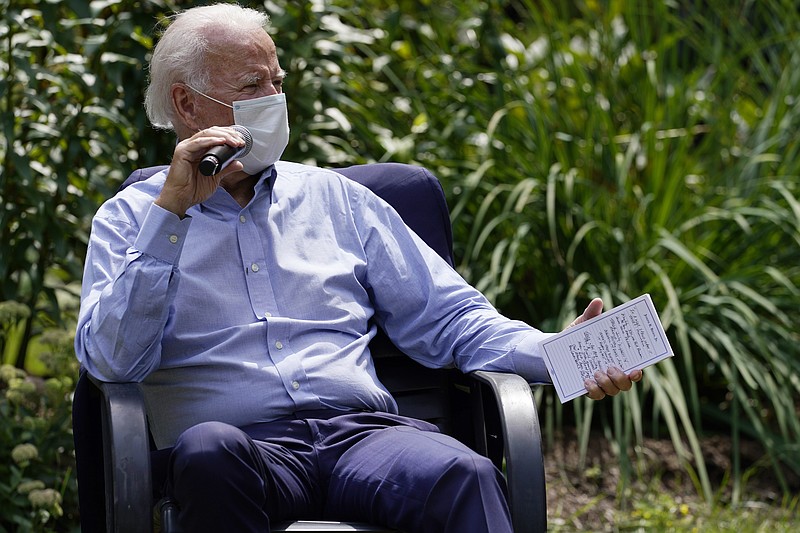To date, James Buchanan is the only man from Pennsylvania to have been elected president of the United States. Joseph Robinette Biden Jr. aims to be the second.
Though their nominations are more than a century and a half apart, they have a remarkable amount in common. And we believe the 21st-century election of a nominee born in the Keystone State could be just as consequential as the election of the nominee from the 19th century.
Let's start with the commonalities.
They're both Democrats, and they both have spent the majority of their lives working in government, for the most part at the federal government till.
Indeed, if Biden, 77, were elected, it would be exactly 50 years since he won his first office, the New Castle County (Delaware) Council, in 1970. No presidential candidate from any major party has been nominated for the first time that many years after first winning elected office since the formation of the modern party system in 1828.
Buchanan is the closest Democrat to that mark. He became the nominee in 1856, 42 years after he was first elected to the Pennsylvania legislature. He first was elected to federal office, as a member of the U.S. House, six years later.
If Biden were to win, he would join Buchanan as the only nominees to win the presidency on their third try. Buchanan sought the job in 1844 and 1848 before winning it eight years later.
The former longtime U.S. senator from Delaware and eventual vice president under President Barack Obama ran in 1988, dropped out after he was caught plagiarizing a speech from former British Labor Party leader Neil Kinnock and falsely reporting part of his academic record. He also ran in 2008 but dropped out after getting less than 1% of the vote and finishing fifth in the Iowa caucus.
He also was dogged by what some feel were racist comments in the latter race, referring to then-Sen. Obama as "the first mainstream African-American who is articulate and bright and clean and a nice-looking guy," and saying, "You cannot go into a 7-11 or a Dunkin' Donuts unless you have a slight Indian accent. I'm not joking."
Biden also holds the mark for the longest span of time between any nominee between his first run in 1988 and his current run in 2020.
Supporters say all those years add up to valuable experience. That's what supporters of Buchanan said, too. He, after all, had been a member of the U.S. House, envoy to Russia, a U.S. senator, secretary of state and minister to Great Britain before becoming president.
If Biden were elected, it's already well known he would become the oldest president at his inauguration - 78 years and 61 days. The second oldest Democrat? That would be Buchanan, who was 65 years, 315 days old.
Beyond the commonalities, we believe it's possible, if elected, Biden could approach Buchanan, who is often cited as the country's worst president.
Buchanan, with posts in Russia and Great Britain and as secretary of state, might have been assumed to be a master of diplomacy, but he more or less took a laissez-faire attitude toward slavery and secession as the country crept toward war.
The territorial issue of slavery, he said in his inaugural address is "happily, a matter of but little practical importance."
Later as states threatened to secede, he said, "It is beyond the power of any president ... to restore peace and harmony among the states. Wisely limited and restrained as is his power under our Constitution and laws, he alone can accomplish but little for good or for evil on such a momentous question."
As U.S. cities burned this summer, Biden took a similar laissez-faire attitude. He frequently defended the "peaceful protesters" and suggested bringing in National Guard troops was a political attempt to use the military as a "prop." Only recently, as polls showed Americans aghast at the mayhem, has he spoken up to condemn violence and the terrorist antifa group.
The threat of civil war kept Buchanan from being an activist in foreign affairs, but he did tell Congress in 1858 it was "the destiny of our race to spread themselves over the continent of North America." Indeed, according to the University of Virginia's Miller Center, he wanted to make an incursion in Mexico to establish a military protectorate in the northern part of the country, but Congress did not provide him money for that or for funds to police Central America.
Biden, who chaired the Senate Foreign Relations Committee from 2001 to 2003 and 2007 to 2009, considers himself an expert in the field. But Robert Gates, who served as defense secretary under Obama, said in his memoir - and stood by it later on a CBS news show - that Biden has "been wrong on nearly every major foreign policy and national security issue over the past four decades."
For instance, he vehemently opposed the surge of troops to turn the tide in the Iraq war in 2007, a decision that many on both sides of the political aisle later credited for drawing the war to an eventual close.
We cite just two examples of Biden's Buchanan-esque lack of leadership, but there are many. For both Pennsylvania nominees, experience didn't necessarily mean insight.
